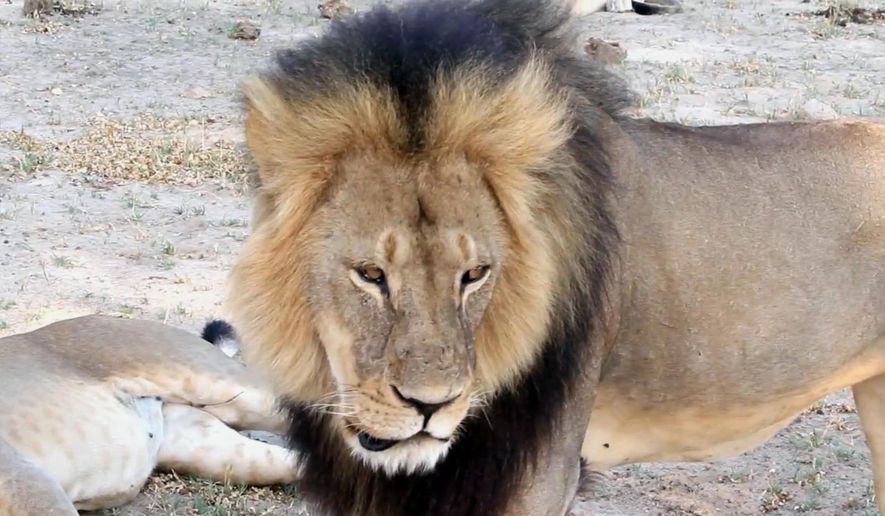Zimbabwe has said it would seek extradition for Minnesota dentist Walter Palmer who is accused of illegally killing a beloved lion during a big game hunt in July.
But as Mr. Palmer returned to work Tuesday, those extradition calls appear to have stalled.
If Mr. Palmer were to be extradited, it would reportedly be the first time the U.S. has handed over an American citizen to Zimbabwe since an extradition treaty between the two countries took effect in 2000.
Of the 48 Americans extradited to face criminal charges in foreign countries over the last three years, none have been sent to any of the 15 African nations with which the U.S. has extradition treaties, according to data provided by the U.S. Marshals Service.
Nor had any of those Americans been charged with hunting or poaching-related crimes.
Oppah Muchinguri, Zimbabwe’s environment minister, said in late July officials were working to extradite Mr. Palmer to face charges related to participation in an illegal hunt. However this week, Zimbabwe police officials told the Associated Press that there had been no developments in the case.
“I still have nothing on that case,” police spokeswoman Charity Charamba told The Associated Press.
The U.S. Justice Department and State Department, which would both be involved in any extradition, have declined to comment on the case.
“As a matter of policy, we generally do not comment on extradition matters, including neither confirming nor denying whether a country has made am extradition request,” said DOJ spokesman Peter Carr.
Uncertainty over the case against Mr. Palmer comes as the dentist returned to work at his private practice Tuesday after nearly six weeks in hiding.
Flanked by a security guard, Mr. Palmer walked silently past hoards of media and protesters encamped outside his office. Several protesters held signs advocating for Mr. Palmer’s extradition and it remains to be seen whether massive outcry over the killing of the lion, known as Cecil, will have any bearing on how the case is handled.
The U.S. Marshals Service, which plays a role in turning over wanted American citizens to foreign governments, provided The Washington Times with documents detailing 48 extraditions of Americans over the last three fiscal years.
While Americans have been shipped off to face charges in many nations, the majority have been sent to three countries. According to the data from fiscal 2012 through 2014, 54 percent of extraditions have sent Americans to Canada, Mexico or Australia.
That Zimbabwe has not yet lodged an extradition request might be a symptom of its inexperience in doing so rather than an indication it will not file such a request, said Pam Stuart, an extradition lawyer and former trial attorney at the DOJ’s Office of International Affairs.
“Quite honestly it takes a lot of gumption for a small country to make an extradition request,” she said.
Part of the difficulty in an extradition of Mr. Palmer is determining the corresponding crime in the U.S. that would make him eligible for extradition to Zimbabwe, Ms. Stuart said.
Zimbabwe’s treaty with the U.S. requires “dual criminality” — that the act be a crime in both Zimbabwe and the U.S. The treaty also requires that the crime be punishable by at least one year in prison.
The crimes that resulted in the most extraditions of Americans over the last three fiscal years are homicides (14), followed by drug crimes (9) and sex offenses (9).
All but one of the nine extraditions to Mexico were related to homicide charges, the other was for narcotics. The 11 extraditions made to Canada during fiscal years 2012 through 2014 include a variety of crimes like robbery, manslaughter and child sex assault.
Several Americans handed over to Canadian authorities during that time include protesters charged in connection with in violent riots that caused more than $750,000 worth of damage to downtown Toronto during the 2010 G-20 Economic Summit.
Others extradited over the last three years include:
• LeVeck Roberts, a dual-citizen of the U.S. and Bermuda who was sent back to Bermuda to stand trial in a 2013 double murder. He was convicted this year and sentenced to life in prison.
• Ex-Playboy Playmate Brandi Brandt and her former boyfriend, motorcycle stuntman Rusty Setser, who were extradited to Australia to face accusations of orchestrating a cocaine distribution ring. Brandt was sentenced to six years in prison. It was unclear sentence Setser received.
• Jonathan Nunez, a former sailor, who received a 10-year prison sentence in Japan after he was extradited back to the country to face narcotics charges. He was found guilty of smuggling close to 30,000 doses of MDMA, commonly known as Ecstasy, through the U.S. military postal system.
• Edin Dzeko and Rasema Handanovic, two Bosnians who immigrated to the United States and obtained citizenship, who were extradited to their home country to face war crimes charges stemming from atrocities committed during the Bosnian War in the 1990s.
There has also been speculation that the poor conditions of Zimbabwe’s prisons could deter U.S. authorities from honoring any extradition request.
But Ms. Stuart said that is unlikely if a formal request is actually made because the treaty itself serves as a form of endorsement of a foreign country’s criminal justice system.
“If we have a treaty, we figure those people must be just. We don’t have extradition treaties with, say, Saudi Arabia,” Ms. Stuart said. “And [a treaty] wouldn’t go into force if it wasn’t approved by the Senate.”
Richard Chibuwe, the deputy chief of mission at Zimbabwe Embassy in Washington, D.C., said last week that there were no further updates available on the possibility of the extradition request.
“The extradition treaty is very specific,” he said. “If we can meet that criteria, then we believe that will be possible.”
• Andrea Noble can be reached at anoble@washingtontimes.com.




Please read our comment policy before commenting.